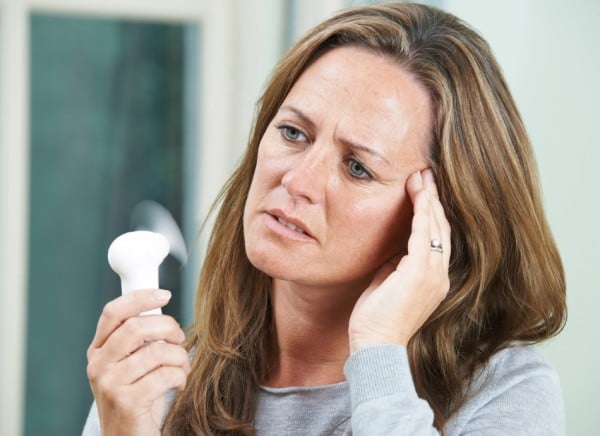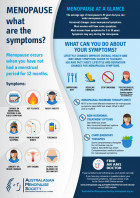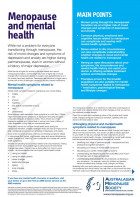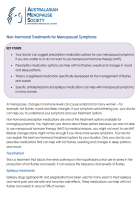Scam alert: Ads or websites claiming to have Medsafe approval or with the Medsafe logo are fake. Medsafe doesn’t endorse any health products, services or brands. Go to Medsafe for official information.
Menopause
Key points about menopause
- Menopause simply means the end of a woman’s menstrual periods.
- Menopause is a normal part of life; you are said to have reached menopause after you have had no more periods for 12 months.
- The usual age is between 45 and 55 years. The average in Aotearoa New Zealand is 52 years.
- About 70% of women have significant symptoms in the years leading up to menopause and 40% will see a doctor because of their symptoms.

Menopause is a normal part of getting older and happens when your body stops preparing for a baby each month. You stop menstruating (having periods) due to changes in hormones (oestrogen and progesterone) made by your ovaries. You are said to have reached menopause when you haven't had a period, or spotting, for 12 months. The years leading up to menopause are called perimenopause and during this time you may notice changes in your periods – how often you have them, how long they last and how heavy they are.
The reduction and fluctuation in hormones can cause other symptoms such as:
- forgetfulness
- brain fog – losing words or your train of thought
- mood swings and irritability
- depression or low mood
- hot flushes
- night sweats
- palpitations (irregular heart beats)
- decreased libido (sex drive)
- sleep problems
- vaginal dryness and discomfort with penetration
- joint pains.
Not everyone experiences these, but you may find they have quite an impact on your quality of life. If you do, talk to your healthcare provider about getting some help to manage your perimenopause.

Image credit: Depositphotos
There are 3 types of menopause based on the age when it happens and another type based on the cause:
- Natural menopause happens between the ages of 45 and 55. Symptoms of perimenopause can begin in the early 40s.
- Early menopause happens between the ages of 40 and 45.
- Premature menopause happens before 40 years of age. It's also called premature ovarian insufficiency. Usually, no cause is found for this. Premature menopause can run in families. Other less common causes include chromosomal problems, such as Turner syndrome, and autoimmune disease when your body's immune system attacks the developing eggs.
- Artificial menopause can be caused by surgery on your ovaries or having them removed. It can also be caused by chemotherapy, or radiotherapy to your pelvis.
Menopause can be divided into 2 stages:
- Perimenopause – during the year or years before your periods stop completely (perimenopause) your periods will change – they may get shorter, longer, lighter or heavier. They may be closer together, or further apart. This may go on for a year or more. Be aware that you can still get pregnant during this time so it's important to use reliable contraception. Eventually, your periods will stop altogether. Perimenopause is when you may start to experience anxiety, insomnia, brain fog and other symptoms. Because you're still having periods you may not realise it's due to hormonal fluctuations and sometimes healthcare providers don't either!
- Postmenopause – you're considered to be ‘postmenopausal’ 1 year after your last menstrual period.
When you go through menopause, your periods will change and eventually stop. You may have some or all of the symptoms mentioned in the section above.
Menopause is diagnosed based on your symptoms and changes in menstruation, along with being over 40 years of age. You don't need to have a hormone test to 'prove' you are menopausal unless you are under 40.
Hormone levels vary from person to person and can even vary from day to day for the same person. This is why it's rarely helpful to get a hormone level blood test during perimenopause. If you're taking contraceptives they can also affect your results.
Menopause can make you feel like you are losing control of your mind and your body. Understanding what symptoms to expect may help.
You may find a change in your periods is all you notice as you go through menopause. However, because the female hormones affect other parts of your body, you may also have any of the following symptoms:
- Hot flushes – these feel like someone has poured hot water into your veins. They can start in your face and neck and spread all over your body or be a sudden feeling of heat all over. Many people feel embarrassed and think others will notice, but it's usually not noticeable.
- Sweats – which often go with flushes and are common at night.
- Loss of libido (sex drive).
- Dryness in your vagina and around your urethra can lead to uncomfortable sex, bladder infections or wetting your pants sometimes.
- Sleep problems.
- Palpitations – your pulse or heart may feel like they are racing, or you may feel faint or dizzy from time to time or get ringing in your ears.
- Mood changes – you may feel fatigued, irritable, depressed, tearful or angry. This can be from hormonal changes, because you're not sleeping well or because you're adjusting to change.
- Skin changes – your skin may look more tired and be less firm, and the hair on your head, armpits and legs may get thinner. Your breasts may become more droopy.
- Joint pains.
- Bones – you won't feel it, but your bones will start to reduce in density – this happens very slowly but over the next 30 or 40 years can cause problems such as osteoporosis. Menopausal hormone therapy (MHT) is recommended if:
- you have a family history of hip or wrist fractures
- you have premature menopause, or
- you're taking long term steroids.
Note: if you have very heavy periods, or bleeding between your periods or after intercourse, you must contact your healthcare provider.
The average duration of perimenopausal and menopausal symptoms is 5 years although you may have symptoms for longer.
Menopause is a normal part of life. Allow yourself time to adjust to what you're experiencing and try to get support from others, especially from your partner and whānau. If they understand what you're going through it will help them know how they can best support you. Watch the videos below together. Seek help if you think MHT could help you.
Don't forget about contraception!
- If you're under 50, the general advice is you still need contraception for 2 years after your final menstrual period (FMP).
- If you're 50 or over when you reach menopause, you need to continue contraception for at least one year after your final period.
Video: Menopause what are the symptoms?
Professor Susan Davis talks about menopause signs.
(International Menopause Society, 2023)
This video is also available in Mandarin(external link), Vietnamese(external link) and Cantonese(external link)
Video: Menopause – how will it affect my health?
Professor Susan Davis explains how the onset of menopause may affect your health.
(International Menopause Society, 2023)
This video is also available in Mandarin(external link), Vietnamese(external link) and Cantonese.(external link)
Video: Menopause – what is menopausal hormone therapy (HRT)?
Professor Susan Davis discusses the basics of menopausal hormone therapy (MHT).
(International Menopause Society, 2023)
This video is also available in Mandarin(external link), Vietnamese(external link) and Cantonese(external link)
Video: Menopause – is menopausal hormone therapy (HRT) safe?
Professor Rod Baber discusses the safety of menopausal hormone therapy (HRT).
(International Menopause Society, 2023)
This video is also available in Mandarin(external link), Vietnamese(external link) and Cantonese.(external link)
Video: Menopause – complementary therapies
Dr Anna Fenton discusses complementary treatment therapies for menopausal symptoms.
(International Menopause Society, 2023)
This video is also available in Vietnamese(external link) and Cantonese.(external link)
Video: Menopause – non-hormonal treatment options
Dr Anna Fenton discusses a variety of non-hormonal treatment options for menopausal symptoms.
(International Menopause Society, 2023)
This video is also available in Mandarin(external link), Vietnamese(external link) and Cantonese(external link)
Video: Menopause – will it affect my sex life?
Professor Susan Davis discusses how the onset of menopause may affect your sex life, as well as various treatment options.
(International Menopause Society, 2023)
This video is also available in Mandarin(external link), Vietnamese(external link) and Cantonese.(external link)
If you have ongoing symptoms which are not relieved by self-care measures, see your healthcare provider for advice. They may recommend you have some tests if there is concern that physical changes are a sign of illness, such as thyroid disorder, or if menopause occurs at an early age.
You may be offered menopause hormonal therapy (MHT, used to be called HRT) to reduce the menopausal symptoms. This is the best treatment for menopausal symptoms and is considered safe for most women. Read more about menopausal hormone therapy (MHT). If you would prefer not to take MHT, or it's not advised for you, there are other prescribed medicines that may help relieve some symptoms. Talk to your healthcare provider about these.
For vaginal dryness, you can be offered 'topical' oestrogen which works well and comes as pessaries or cream to apply directly to your vulva and vagina. This is not absorbed so is safe if you've had breast cancer. It will also reduce your risk of bladder problems.
If you are at risk of thinning bones (osteoporosis) MHT is an excellent treatment. You may be offered bisphosphonates.
Menopause is a good time to have a general health check, including blood pressure, a cervical screening test, breast examination, mammogram and possibly a bone density scan. You should also discuss ways to look after your health over the coming years with your healthcare provider
Read more about menopause treatment and management.(external link)
Menopause affects people in different ways and symptoms vary hugely in severity. You may have very little discomfort, or you may find that your symptoms interfere with your normal daily activities.
While some people have a sense of loss when going through menopause, many others feel they get a new lease on life. They enjoy having no periods and no more worries about pregnancy. Many feel more confident and that they have 'come into their own'.
As you move further past menopause, the vulva, vagina and urethra (genital area or 'perineum' – the area between your legs) becomes more uncomfortable and fragile due to loss of elasticity and lubrication. This is called genitourinary syndrome of the menopause or GSM. This increases your risk of urinary infections (UTIs) as well as pain and difficulty with vaginal penetration, and difficulty 'holding on' to urine. Oestrogen preparations that are applied to the area are recommended as you get older. They can help reduce your risk of UTIs as well as helping with vaginal symptoms. They are very safe, even if you've had breast cancer.
If you're concerned that your quality of life is being affected by your menopause symptoms, try the ideas listed in the self-care section below or see your healthcare provider for further advice.
Going through menopause can make you feel as if you're not in control of your own body, but there are ways to ease the symptoms.
Additional ways to ease symptoms of menopause:
- Try relaxation and stress-relief techniques, eg, meditation and mindfulness.
- Use a lubricant to help with vaginal dryness, or your doctor may prescribe an oestrogen-based vaginal cream or pessary.
- Exercise regularly and keep fit. Weight-bearing exercises (eg, walking) are good for your bones. Doing pelvic floor exercises can help improve any incontinence.
- Keep your weight healthy and eat a diet low in sugar, salt and saturated fats but high in calcium, fibre and healthy fats. This will help protect your bones, joints and heart.
- Researchers are looking at whether eating phytoestrogens (natural oestrogens contained in foods such as soy, beans, grains and some fruit and vegetables) can help menopause symptoms. We don't know yet. However, these foods are healthy and low-fat, so are generally good choices.
- Stop smoking.
- Get more sleep.
- You may find some alternative therapies such as acupuncture or hypnosis help. Phytoestrogens (eg, soy products) may be helpful for hot flushes during perimenopause but there's not enough evidence over the longer term. Phytoestrogens are not safe if you have breast cancer. There's no alternative therapy that's as good as MHT.
- Counselling, particularly cognitive behavioural therapy (CBT) may help.
If you've tried these self-care options you're still not getting the relief you need, talk to your healthcare provider for further advice and treatment options.
In the long term, you can lower your chance of getting osteoporosis and of developing heart disease by having a healthy lifestyle. This includes:
- a good diet
- regular exercise
- staying in a healthy weight range
- not smoking
- consuming little or no alcohol.
If you're at particular risk for developing osteoporosis or heart disease, your healthcare provider may recommend additional measures such as menopausal hormone therapy (MHT). Be well informed – it will help you understand why you are feeling the way you do and to decide whether or not you need treatment.
- Being stressed, overtired and anxious.
- Too much coffee, tea or alcohol.
- Smoking.
- Hot drinks and spicy foods can make the hot flushes worse.
The Australasian Menopause Society(external link) provides a range of educational material and resources on midlife and menopause for the benefit of women.
Will menopause affect my sex life?(external link) Australian Menopause Society
Menopause section(external link) Jean Hailes Women's Health, Australia
Menopause(external link) NHS Choices UK, 2022
Menopause over martinis(external link) Sarah Connor's website provides many links to articles, interviews and other information sources plus suggestions for hosting dinner parties to talk about menopause. Sarah is a writer, speaker and advocate for raising awareness about menopause in Aotearoa New Zealand.
Brochures
Menopause what are the symptoms?(external link) Australasian Menopause Society, Australia English(external link), te reo Māori(external link), Vietnamese(external link)
Non-hormonal treatment options for menopausal symptoms(external link) Australasian Menopause Society
Complementary medicine options for menopausal symptoms(external link) Australasian Menopause Society
Maintaining your weight and health during and after menopause(external link) Australasian Menopause Society
Menopause and mental health(external link) Australasian Menopause Society, Australia
What is menopausal hormone therapy (MHT) and is it safe?(external link) Australasian Menopause Society
Menopause(external link) RANZCOG, Australia
References
- Testing for menopause(external link) Menopause Care, US
- Menopause what are the symptoms?(external link) Australasian Menopause Society, Australia
- Menopause section(external link) Jean Hailes Women's Health, Australia
- Menopause(external link) NHS Choices, UK, 2022
- Menopause(external link) Auckland Regional HealthPathways, NZ, 2025
Clinical resources
Diagnosing and managing primary ovarian insufficiency(external link) BPAC, NZ, 2019
The Australasian Menopause Society(external link) provides a range of educational material and resources on midlife and menopause for the benefit of health professionals.
Information for health professionals(external link) including Cochrane reviews, education, information sheets, GP and HP resources - The Australasian Menopause Society, 2013
A useful toolkit to guide clinicians with managing menopausal symptoms is now available:
A practitioner's handbook for the management of the menopause(external link) Monash University, Australia, 2014.
Menopausal hormone therapy – where are we now?(external link) BPAC, NZ, 2019
Continuing professional development
Webinar: Menopause – getting it right for your patients(external link) Professor Bev Lawton, Founder/Director of Te Tatai Hauora o Hine
This presentation covers:
- Menopause symptoms and treatment options.
- The benefits and risks of using MHT.
- Treatment disparities for Maori and Pacific women.
- How to have a conversation about menopause.
- GU and vaginal health.
Video: He Ako Hiringa - Menopause Webinar
You can watch the video, answer questions and claim hours with a certificate.
(My Health Hub, NZ, 2023)
Podcast: Menopause – Anna Fenton(external link) Goodfellow Podcast, NZ, 2019
Anna Fenton discusses the management of menopause. Anna is a gynaecological endocrinologist at Canterbury DHB where she is clinical lead for bone densitometry. She is a member of the pharmacology and therapeutic advisory committee for endocrinology and is past president of the Australasian Menopause Society.
Webinars
Premature ovarian insufficiency – Dr Megan Ogilvie(external link) (PHARMAC seminars, NZ, 2019)
Menopause and menopausal hormone therapy – (parts 1 & 2) Drs Megan Ogilvie and Stella Milsom(external link) (PHARMAC seminars, NZ, 2019)
Managing menopause – myths and misconceptions(external link) (Goodfellow Unit Webinar, NZ, 2018)
Brochures

Menopause – what are the symptoms?
Australasian Menopause Society English, te reo Māori, Vietnamese

Menopause and mental health
Australasian Menopause Society, Australia, 2023

Non-hormonal treatment options for menopausal symptoms
Australasian Menopause Society, Australia, 2025
Credits: Healthify editorial team. Healthify is brought to you by Health Navigator Charitable Trust.
Reviewed by: Dr Alison Payne, Specialist General Practitioner, Martinborough
Last reviewed:





